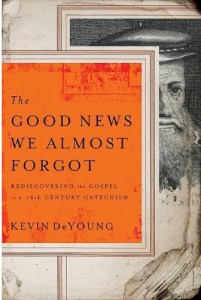
THE CROSSING BLOG
Apologetics for Everyone
1 Peter 3:14-16 – But even if you should suffer for righteousness’ sake, you will be blessed. Have no fear of them, nor be troubled, but in your hearts honor Christ the Lord as holy, always being prepared to make a defense to anyone who asks you for a reason (Greek: apologian) for the hope that is in you; yet do it with gentleness and respect, having a good conscience, so that, when you are slandered, those who revile your good behavior in Christ may be put to shame.
a•pol•o•get•ics | əˌpäləˈjetiks |
When people think of apologetics, they typically think of some sort of intellectual debate or argument defending the Christian faith against some form of intellectual opposition. Though there are contexts where this type of debating can be helpful, this is not what apologetics was meant to be.
1 Peter 3:15 is the classic text from which the term apologetics comes from. People often take the verse to mean something like, “always be prepared to defend Christianity.” This leads people to spend time learning intellectual rebuttals to intellectual attacks on the faith. The reality is though, that’s not what Peter was talking about. In the context of the letter, Peter is encouraging suffering Christians to live as God’s distinct and holy people. Specifically in chapter 3, he is encouraging these persecuted Christians to have unity, sympathy, love, and humility toward all people; to refrain from retaliation, to love their enemies, to seek peace with all people, all the while looking to Jesus as the supreme example of this type of faithful witness. Peter knows that when the Christian community lives this unique type of life, it will inevitably provoke questions about the source of this unusual and attractive hope.
“How is it that you all can love like you do?” “How can you remain faithful in the face of suffering?” “Why do you serve people who mistreat you?” “Where does your hope come from?” Peter says, when these questions come, be prepared to give a reason (apologia) for the hope that is in you?
Apologetics then, is answering the questions raised by the distinctive lifestyle of our Christian community.
If this is the case, the main question for us as the Christian community is: Are we actually living in a way that would provoke these types of questions? Is our lifestyle distinct from the world’s? Do we love people that are unlovable? Do we serve people who are thankless and unappreciative? Do we have hope in the midst of suffering? Do we give to those in need even when it hurts? And do we do these things in context where this love can be seen and experienced by those who do not know Christ?
In other words, is our Christian community an attractive light in the midst of a broken city? And are we living in a way to make that light visible to the people around us who still live in darkness?
The Conundrum of Grace that Works
For I am the least of the apostles, unworthy to be called an apostle, because I persecuted the church of God. But by the grace of God I am what I am, and his grace toward me was not in vain. On the contrary, I worked harder than any of them, though it was not I, but the grace of God that is with me. (1 Corinthians 15:9-10)
I have always loved Christian biographies and autobiographies. I have unashamedly told many friends and relations that, outside of the Bible itself, I find more spiritual nourishment in the stories of these men—broken and marred by sin as they are, as they experience and proclaim the grace of God—than anywhere else. There is a lot of good that one could procure by reading stories about Hudson Taylor, George Müller, David Brainerd, Adoniram Judson, and hundreds of others within the cloud of witnesses (Hebrews 12:1).
However, I recently found myself in a conversation with a dear friend when the subject of God’s grace and our efforts came up. We were both struggling with the thought that it seems as though, throughout history, God’s choicest saints were also those that tended to work the hardest in the work and proclamation of the gospel.
This thought seemed strange to both of us.
Yet somehow, as we can see above, Paul’s hard work did not diminish the glory and sovereignty and grace of God at all in his ministry. If anything, it amplified it. Paul bursts forth with praise and thanksgiving for God over and over for the works that are produced by the gospel.
In speaking about proclaiming the gospel, Paul declares, “For this I toil, struggling with all his energy that he powerfully works within me,” (Colossians 1:29).
After Paul defends his ministry to the Corinthian church, setting forth the case that his sufferings have attested to his apostleship more than any of the “super-apostles” that are denouncing him, he sums up his defense by partially quoting Jeremiah 9:24 when he says, “Let the one who boasts, boast in the Lord,” (2 Corinthians 10:17).
And in one of the most powerful passages that illuminates the saving grace of God that comes through faith in His Son, Paul culminates the passage with, “For we are his workmanship, created in Christ Jesus for good works, which God prepared beforehand, that we should walk in them,” (Ephesians 2:10).
So what are we to make of all of this?
For one, God’s saving grace is completely unmerited on the part of the believer. To think that one could act good enough or perform enough good works is a sentiment that has so many passages within the New Testament that denounce it that I would easily run out of room attempting to quote them here.
Secondly, throughout the Bible, laziness is deplorable, so the answer cannot be a simple “Let go and let God” sentiment that has unfortunately infiltrated into much of the church today. In terms of the work of the kingdom, one would be hard-pressed to find any scriptural warrant for this thought, but may rather find themselves taken aback by its condemnation (Matthew 25:26-30).
What I think that we can learn from these passages (and others like it) is that there is a sense in which working hard will expose us to the grace of God in ways that we would have previously thought impossible. And I think that it will come through seeing how insufficient our hard work actually is, and how reliant we really are on the grace of God for all things, both hard and easy, big and small.
So why bring this up to the church? For one, we have recently experienced a large amount of God’s grace in the joining of what were two separate local church bodies. The grace experienced in this conjoining is almost certainly achieved through the hard and faithful work of many. Yet who would have thought that God’s grace would manifest itself in this way?
Additionally, we are still living in a city within a world at a time when the need for the gospel is immense. We must work towards the display and proclamation of the gospel of God’s grace in the death and resurrection of His Son. And by His grace, we certainly will.
Brokenness is Where Healing Begins
All of us sin… I’m not saying that we have all sinned (though that is true, Romans 3:23), but we all—actively, persistently—sin. If we say otherwise, we lie, but if we confess our sins—if we agree with God that we have fallen short of His holy standard—He is faithful and just to forgive us our sins and to cleanse us from all unrighteousness (1 John 1:8-9).
The Gospel—that Jesus died and rose again to forgive us, cleanse us, and cancel the record of debt that stood against us—should free us to humbly confess our sins to one another, knowing that there is no condemnation for those who are in Christ Jesus!
Confession is the response to true brokenness, and brokenness is the place where healing begins. “Therefore, confess your sins to one another and pray for one another, that you may be healed” (James 5:16).
Heidelberg Cat
 I was telling a few friends about a book that I received as a Christmas (or birthday?) gift last week (that’s a subtle plug for my recent birthday in case you missed it… haha, but seriously). Anyway… I mentioned my excitement for this book about the Heidelberg Catechism. Yes, “my excitement.“ Without much goodwill, my friends (ehem Joey and Max) began to mock me and the book. I told them that they couldn’t hate on a book they had never read. So here is my attempt to defend the enjoyability, and devotional value of a book that I am VERY excited about (and so is my wife, who doesn’t put up with “boring” books).
I was telling a few friends about a book that I received as a Christmas (or birthday?) gift last week (that’s a subtle plug for my recent birthday in case you missed it… haha, but seriously). Anyway… I mentioned my excitement for this book about the Heidelberg Catechism. Yes, “my excitement.“ Without much goodwill, my friends (ehem Joey and Max) began to mock me and the book. I told them that they couldn’t hate on a book they had never read. So here is my attempt to defend the enjoyability, and devotional value of a book that I am VERY excited about (and so is my wife, who doesn’t put up with “boring” books).
The book is The Good News We Almost Forgot: Rediscovering the Gospel in a 16th Century Catechism, by Kevin DeYoung. Here is a plug from Kevin’s blog:
I’ve written before about how awkward it can feel to plug your own books. But I press on nonetheless, because you all are kind and I believe this book is important. My newest book, The Good News We Almost Forgot: Rediscovering the Gospel in a 16th Century Catechism will be available at the end of March. If the topic itself doesn’t thrill you, just look at the sweet picture of Ursinus. He’s part professor, part Santa Claus, part back-from-Davy-Jones’-Locker Pirate of the Caribbean.
Needless to say, I’m a huge fan of the Reformed confessional tradition in general and of the Heidelberg Catechism in particular. But even if you are not Reformed or have a “no creed but the Bible” aversion to catechisms and confessions I encourage you give the Heidelberg a try. It is better than you think.
And here’s a snippet from the intro:
If you’ve ever found understanding the Bible a bit like exploring America on foot, interesting but overwhelming and slow-going, why not use the Heidelberg Catechism as a map? The Catechism can help show you the main attractions others have discovered in the Bible and lead you to the best, most important truths of our faith. As the saying goes (to change our metaphors once again), you can see farther when standing on the shoulders of giants. And the Heidelberg Catechism is a giant of mind-sharpening, Christ-worshiping, soul-inspiring devotion. Stand on its shoulders and see more of Christ who saves us from our guilt by His grace and makes us, through His Spirit, wholeheartedly willing and ready to live for Him.
And last—for those of you who persevered through this post—here is a link to a rap song by Curtis Allen (aka Voice) about Kevin’s book: The First Ever Rap Song About the Heidelberg Catechism. Voice wrote the rap in response to a challenge by C.J. Mahaney at the 2010 NEXT Conference. Enjoy.
A Part of This Great Story
On Sunday we talked about Our Role in God’s Story, the Story about the redemption of God’s Kingdom. The following quote about God’s Kingdom Story was posted this morning on a blog called Of First Importance: Living Each Day in the Good of the Gospel.
“The kingdom of God is the new and final age that began with the coming of Jesus. His kingdom is not part of the present age — an age where the flesh reigns; where people are divided, relationships are broken, and suspicion and competition dominate; where money, sex, and power are abused; where leaders are first and servants are last; where behavior is controlled by laws, and identity is defined by race, gender, or social standing; and where gifts and resources are used for the advancement of oneself.
Rather, the kingdom of God is the new age. It is the age of the Spirit (Matt 12:28). It is the age of righteousness, peace, and joy in the Holy Spirit (Rom 14:17). The kingdom of God is about the renewal, restoration, and reconciliation of all things, and God has made us a part of this great story of salvation.”
– Neil H. Williams, Gospel Transformation (Jenkintown, Pa.; World Harvest Mission, 2006), iii.
Every day Of First Importance posts a thoughtful quote intended to help its readers set their minds on what is of first importance: the Gospel. It’s a good place to visit regularly.
The Story
 What is the Gospel? Well, that question could be answered in a number of different ways. Paul boiled it down to this powerful statement: “That Christ died for our sins in accordance with the Scriptures, that he was buried, that he was raised on the third day in accordance with the Scriptures.” This is the gospel at its core, no doubt about it. But what about for those who don’t understand the problem of sin or the authority of “the Scriptures”? How do you approach the increasing number of people who believe in a “god of love” with the false impression that somehow “love” excludes the possibility of and demand for justice. Or what about the people who don’t believe in God at all. For these types of people — and for every professing Christian who does not yet understand that “the Gospel” is about more than getting your ticket through the pearly gates of heaven — we must get our minds and hearts around reality that we are part of a story, God’s Story, and we have a part to play in it. Take 10 minutes to view an online presentation of the story. It won’t be a waste of time.
What is the Gospel? Well, that question could be answered in a number of different ways. Paul boiled it down to this powerful statement: “That Christ died for our sins in accordance with the Scriptures, that he was buried, that he was raised on the third day in accordance with the Scriptures.” This is the gospel at its core, no doubt about it. But what about for those who don’t understand the problem of sin or the authority of “the Scriptures”? How do you approach the increasing number of people who believe in a “god of love” with the false impression that somehow “love” excludes the possibility of and demand for justice. Or what about the people who don’t believe in God at all. For these types of people — and for every professing Christian who does not yet understand that “the Gospel” is about more than getting your ticket through the pearly gates of heaven — we must get our minds and hearts around reality that we are part of a story, God’s Story, and we have a part to play in it. Take 10 minutes to view an online presentation of the story. It won’t be a waste of time.
The Gospel Coalition
The Crossing is a member of The Gospel Coalition. This is a network of churches and pastors dedicated to keeping the Gospel of Jesus Christ at the center of everything we do. Watch this video to hear the heartbeat of The Gospel Coalition which is also the heartbeat of The Crossing.
